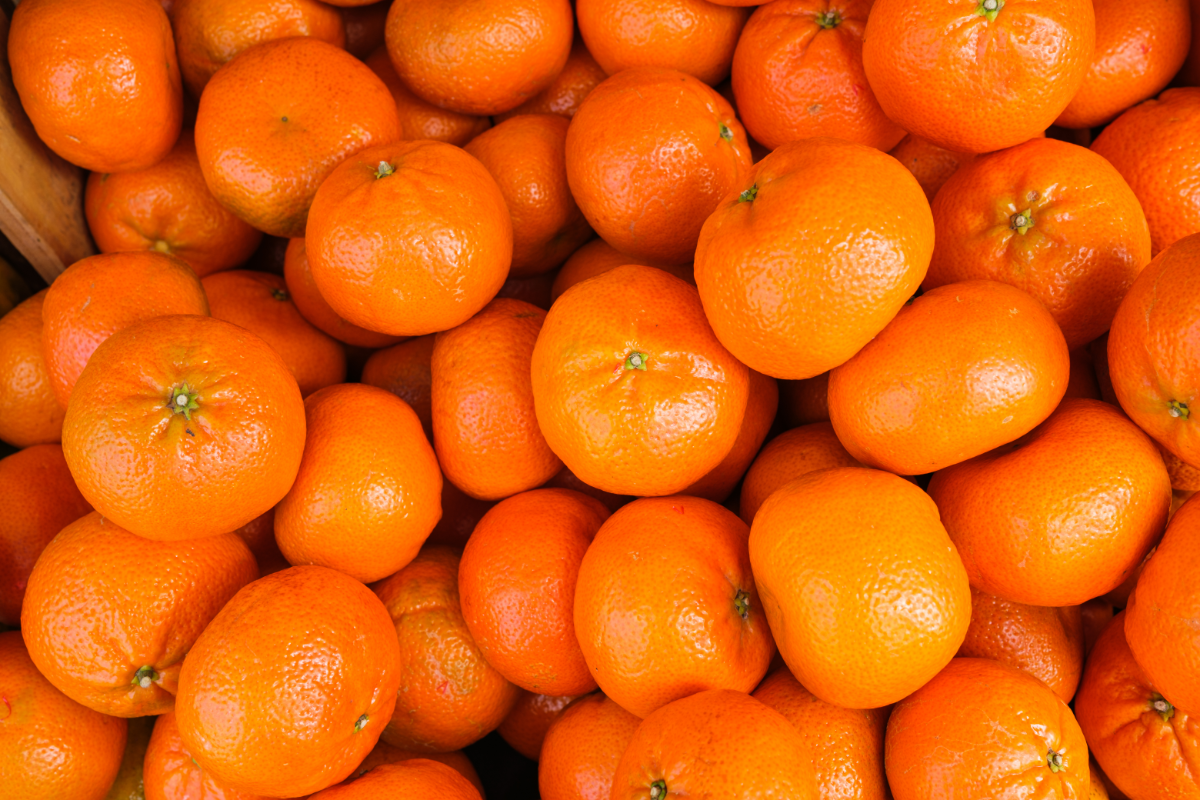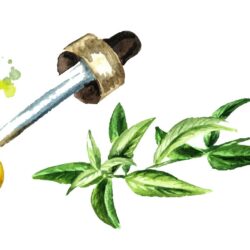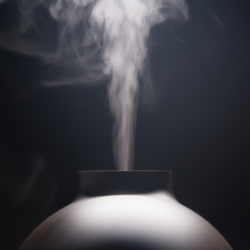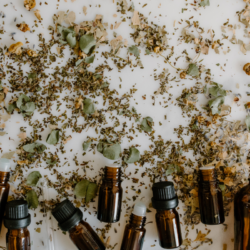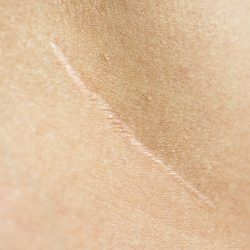The fruit of the mandarin tree is generally highly prized, especially at Chinese New Year, when it represents abundance and good fortune. Its fragrant peel is particularly appreciated in cooking, adding a delectable aroma to savoury dishes.In traditional medicine, the dried peel is generally used to regulate vitality, stimulate digestion, relieve abdominal cramps and reduce gas and bloating. Mandarin is also beneficial for regulating excessive mucus and treating loss of appetite, as well as digestive disorders. In folk medicine, the bark can also be used to treat stomach upsets and gastritis.
Latin name:
- Citrus reticulata
Botanical family:
- Rutaceae
Special feature:
- Natural Prozac
Producing organ:
- Pericarp (zest)
A little history
Originating in south-east Asia, China and perhaps the Philippines, the mandarin owes its name to its colour, reminiscent of the silk robes of mandarins.
Imported to Europe in the early 19th century by Alexander the Great, the mandarin tree has been growing in Algeria since the 1950s. Between two sets of roots, in the good old days, it crossed paths with a sweet orange, giving rise to the clementine. Legend has it that Father Clément accidentally discovered this hybrid in its natural state in Misserghin and duplicated it. Nowadays, because of the sun and the heat, this citrus fruit, nicknamed the “fruit of grace” by the Arabs, is mainly grown in Corsica.
The mandarin tree was first mentioned in the literary work ” The Tribute of Yu “, dating back to the 21st century BC, in which it is mentioned that mandarins, pomelos and sour orange trees were offered as gifts to the emperor.
- The American variety (tangerine Citrus x tangerina, from Citrus aurantium and Citrus reticulata) contains 90% limonene
- Lime is Citrus aurantiifolia (Christmann) Swingle
In traditional Chinese medicine, dried fruit peel is used to regulate vital energy, stimulate digestion, relieve spasms in the abdomen and reduce gas and bloating. It is also beneficial for regulating excess phlegm and treating loss of appetite, vomiting and diarrhoea. In folk medicine, the bark is used to treat stomach pains and gastritis.
The mandarin is highly prized as a fruit, symbolising good fortune and abundance during the Chinese New Year. It is traditionally presented at Christmas festivities in Canada, the United States and Russia. Fresh or dried peel can be used to flavour dishes.
The mandarin is native to south-east Asia, China and possibly the Philippines. It was not imported to Europe and America until the 19th century.
Native to the Middle East, mandarins were cultivated for centuries in Vietnam, Japan and especially China. It owes its name to its colour, which is reminiscent of the silk robes worn by mandarins.
The mandarin tree first put down roots in Europe at the beginning of the 19th century, imported by Alexander the Great at the instigation of the Portuguese, before developing in Algeria from 1950 onwards. In between – around 1900 – its path crossed that of a sweet orange, giving rise to the clementine. It is said that it was Father Clément who discovered this hybrid by chance in its natural state in Misserghin and replicated it.
The term “mandarin” has been around since 1773, but it wasn’t until 1848 that it was cultivated in France.
Today, this citrus fruit, known to the Arabs as the “fruit of grace”, is grown mainly in Corsica, where it enjoys plenty of sunshine and warmth.
The first mention in literature dates back to the 21st century BC in “The Tribute of Yu”, in which it is said that mandarins, pomelos or bigaradiers were brought as gifts to the emperor.
In 1805, Sir Abram Hune introduced them to England from Canton, and they reached Malta and Sicily in 1810. By 1840, mandarins were already being grown around the magnificent plain on which the city of Palermo lies. The mandarin subsequently spread throughout the Mediterranean and the rest of the world.
How do I make essence of mandarin peel?
Mandarin essence is a key ingredient in aromatherapy and cosmetics. It is obtained using a variety of extraction techniques, each of which has a significant impact on the purity and final aroma of the product.
Traditional and modern extraction methods
Traditionally, mandarin essence is extracted by cold pressing. This method involves pressing the skin of the fruit to extract the essential oils, while preserving the integrity of the aromatic compounds. It’s a technique that enhances ancestral know-how and is still highly prized for its authenticity.
However, steam distillation has also proved its worth, allowing the volatile compounds to be separated from the water using steam. This technique ensures gentle extraction and superior quality of the essence.Supercritical CO2 extraction is a more recent and innovative method. It uses carbon dioxide at high pressures to extract the essences, resulting in pure oils with no solvent residues.
Major geographical areas of production
Global mandarin production is dominated by a few key geographical areas. The Mediterranean regions, particularly Spain and Italy, are renowned for their mandarin cultivation and the quality of their essences. These areas benefit from optimal climatic conditions that favour organic citrus growing and the production of high-quality mandarin essence.
In Asia, China is also a major player in mandarin production. With its vast orchards and rapidly expanding industry, China makes a significant contribution to the global supply of mandarin oil.
What are the pharmacological properties of Mandarin peel essence?
Known or presumed mode of action:
- Alpha-pinene and beta-pinene, limonene are expectorants
- Methyl N-methylanthranilate, 60% of which is present in the leaf (mandarin petit grain),anthranilic acid is at the origin of the biosynthesis of benzodiazepines by certain fungi, it is a normal compound in humans
- Anthranilic acid is an intermediate in the biosynthesis of tryptophan
- D-limonene protects against cancer of the skin, liver, breast and colon
Detoxifying, hepatoprotective and choleretic effects:
Detoxifying, hepatoprotective and choleretic, the limonene contained in mandarin oil has a detoxifying action on the liver linked to the stimulation of cytochromes P450 or phase 2 enzymes such as glutathione-S-transferase.
Digestive effect :
Digestive, mandarin essence also reduces nausea by acting on gastric motility and gastric acidity during gastro-oesophageal reflux.
Sedative, anxiolytic and sleep-inducing effects:
A calming agent for the central nervous system (Ʃ-), mandarin is in fact a mild hypnotic. It has a behavioural and physiological anti-stress action and is therefore anti-depressant by inhibiting serotonin re-uptake (action on tryptophan biosynthesis).
Antimicrobial effects:
Antimicrobial and antifungal, it also has antiseptic and antiviral activity against Herpes simplex virus, as well as inhibiting the efflux pumps of Staphylococcus aureus.
Anti-cancer properties :
Anti-angiogenic and anti-tumour, limonene inhibits malignant cell growth, which is why it is described as an emerging antineoplastic agent. In particular, this active ingredient is thought to induce apoptosis via mitochondrial death, as well as suppressing cell mediators.
Other properties:
- Cortisone-like
- Anti-inflammatory
- Anti-free radical
- Antioxidant by inhibiting LDL oxidation and lipid peroxidation
- Lipid-lowering
Are there any precautions to be taken when using Mandarin oil?
- Mandarin oil is photosensitising both internally and externally, so avoid exposure to the sun
- This essential oil is contraindicated for pregnant or breast-feeding women and children under 7 years of age
- Do not use in combination with cortisone, as there is a risk of drug interaction
- Do not use over a prolonged period, as there is a risk of resting the pituitary-adrenal axis and suffering acute adrenal insufficiency if you stop taking the essential oil
- Avoid applying the essential oil in the evening (or before any period of rest)
- Not recommended for people suffering from osteoporosis, due to the inherent risk of decalcification
- Caution in cases of renal insufficiency per os (nephrotoxic)
- Powerful enzymatic inhibitor of CYP2E1 (competitive inhibition), risk of drug interactions, ask your pharmacist for advice
- Prohibited in animals
Medical literature and clinical trials:
- Komori T, Fujiwara R, Tanida M, Nomura J, Yokoyama MM. Effects of citrus fragrance on immune function and depressive states. Neuroimmunomodulation, 1995
- Lima NG, De Sousa DP, Pimenta FC, Alves MF, De Souza FS, Macedo RO, Car doso RB, de Morais LC, Melo Diniz Mde F, de Almeida RN. Anxiolytic-like activity and GC-MS analysis of (R)-( )-limonene fragrance, a natural compound found in foods and plants. Pharmacol Biochem Behav, 2013
- T Gurgel do Vale, E Couto Furtado, JG Santos Jr, GSB Viana. Central effects of citral, myrcene and limonene, constituents of essential oil chemotypes from Lippia alba (Mill.) N.E. Brown. Phytomedicine, 2002
- Araújo ACJ, Freitas PR, Dos Santos Barbosa CR, Muniz DF, Ribeiro-Filho J, Tintino SR, Júnior JPS, Filho JMB, de Sousa GR, Coutinho HDM. Modulation of Drug Resistance by Limonene: Inhibition of Efflux Pumps in Staphylococcus aureus Strains RN-4220 and IS-58. Curr Drug Metab, 2021
- Schuhmacher A, Reichling J, Schnitzler P. Virucidal effect of peppermint oil on the enveloped viruses herpes simplex virus type 1 and type 2 in vitro. Phytomedicine, 2003
- Astani A, Schnitzler P. Antiviral activity of monoterpenes beta-pinene and limonene against herpes simplex virus in vitro. Iranian Journal of Microbiology. 2014
- Guang L, Feng B, Zhan L, Yu Z. 2003. D limonene induces apoptosis of gastric cancer cells. Zhonghua Zhong Liu Za Zhi (Chin J Oncol)
- Igimi H, Tamura R, Toraishi K, Yamamoto F, Kataoka A, Ikejiri Y, Hisatsugu T, Shimura H. Medical dissolution of gallstones. Clinical experience of d-limonene as a simple, safe, and effective solvent. Dig Dis Sci. 1991
- Igimi H, Hisatsugu T, Nishimura M. The use of d-limonene preparation as a dissolving agent of gallstones. Am J Dig Dis. 1976
- Igimi H, Watanabe D, Yamamoto F, Asakawa S, Toraishi K, Shimura H. A useful cholesterol solvent for medical dissolution of gallstones. Gastroenterol Jpn. 1992

